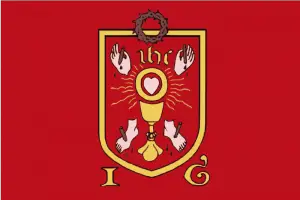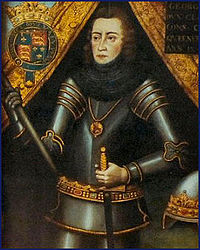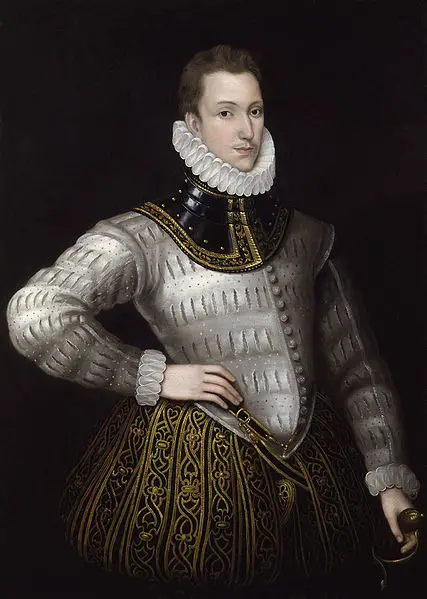 The Pilgrimage of Grace rebellion was an uprising in the North which was sparked off initially by trouble in Lincolnshire. This trouble, in turn, was caused by discontent over the dissolution of Louth Abbey, the government commissions in the area and rumours that these commissions would confiscate jewels and plate from churches and impose new taxes.1
The Pilgrimage of Grace rebellion was an uprising in the North which was sparked off initially by trouble in Lincolnshire. This trouble, in turn, was caused by discontent over the dissolution of Louth Abbey, the government commissions in the area and rumours that these commissions would confiscate jewels and plate from churches and impose new taxes.1
Here is a brief timeline of the main events of the Pilgrimage of Grace:
- 1 October 1536 - Thomas Kendall, Vicar of St. James' Church, Louth, preached a sermon which is thought to have "affirmed that the church or its faith, or both, were in danger."2
- 2 October 1536 - The commons of Louth, led by shoemaker Nicholas Melton, seized John Heneage, the Bishop of Lincoln's registrar, as he tried to read out Thomas Cromwell's commission to the townspeople. His papers were ripped from his hands and burned.
- 3 October 1536 - 3,000 men marched from Louth to Caistor and seized the King's subsidy commissioners.
- 4 October 1536 - Trouble erupted in Horncastle. Two men - Thomas Wulcey (or Wolsey), one of Cromwell's men, and Dr Raynes, the chancellor of the Bishop of Lincoln - were murdered by the rebels. Articles of complaint were drawn up by the gentry, Sheriff Edward Dymmoke and his brother, and then presented to the crowd who held up their hands and said "We like them very well." Their grievances included the dissolution of the religious houses, the grant to the king of the tenths and first-fruits of spiritual benefices, the rise of Thomas Cromwell and Richard Rich onto the King's Council and the promotion of archbishops and bishops who they felt "subverted the faith of Christ". The rebels then decided to march to Lincoln Cathedral.
- 5 October 1536 - The rebels mustered support at Towes and Hambleton Hill.
- 6 October 1536 - The rebels mustered support at Dunholm.
- 7 October 1536 - The rebels from Horncastle, Louth and other Lincolnshire towns met at Lincoln Cathedral. Some say that there were 10,000 men there and others that there were 20,000.
- 8 October 1536 - Lawyer Robert Aske called the people of Beverley, Yorkshire together, asking them to be true to "God, the king, the commonwealth" and "to maintain the Holy Church".
- 9 October 1536 - The rebels of Horncastle, Lincoln, dispatched their petition of grievances to the King, and also north into Yorkshire.
- 10 October 1536 - Robert Aske had become the leader of the commons in the West Riding of Yorkshire, who were now in rebellion.
- 11 October 1536 - The King's herald arrived at Lincoln with the King's reply. Henry VIII did not give into their demands and concluded his message with a warning, "We charge you, eftsoon, upon the foresaid bonds and pains, that ye withdraw yourselves to your own houses, every man ; and no more to assemble, contrary to the laws and your allegiances ; and to cause the provokers of you to this mischief to be delivered to our lieutenant’s hands or ours and you yourselves to submit to such condign punishment as we and our nobles shall think you worthy." The King threatened the rebels with the forces of the Duke of Suffolk and the rebels made the decision to disperse rather than face charges of treason if they were captured.
- 13 October 1536 - Lord Darcy reported to Henry VIII2 that the East Riding, West Riding, North Riding and "all the commons of Yorshire" were "up" in rebellion.
- 14 October 1536 - Sir George Lawson and William Haryngton, Mayor of York, wrote to the King asking for aid because "the commons... have rebelliously assembled to take York".
- 15 October 1536 - Henry VIII wrote to the Earl of Shrewsbury, the Duke of Suffolk "and others" with instructions on handling the rebellion which we now know as the Pilgrimage of Grace. The King also wrote to the rebels in Lincolnshire promising "to show them mercy if they leave all their harness and weapons in the market-place of Lincoln".
- 19 October 1536 - Henry VIII wrote to the Duke of Suffolk, saying, "if it appear to you by due proof that the rebels have since their retires from Lincoln attempted any new rebellion, you shall, with your forces run upon them and with all extremity ‘destroy, burn, and kill man, woman, and child the terrible example of all others, and specially the town of Louth because to this rebellion took his beginning in the same." He also wrote to the Earl of Derby, giving him instructions on how to deal with the rebels at the Abbey of Salley in Lancashire: "we now desire you immediately to repress it, to apprehend the captains and either have them immediately executed as traitors or sent up to us. We leave it, however, to your discretion to go elsewhere in case of greater emergency. You are to take the said abbot and monks forth with violence and have them hanged without delay in their monks’ apparel, and see that no town or village begin to assemble."
- 20 October 1536 - Lord Darcy yielded Pontefract Castle to the rebels. The castle's inhabitants – which included the likes of Lord Darcy, Sir William Gascoigne, Sir Robert Constable, Edmund Lee, Archbishop of York, and Thomas Magnus, Archdeacon of the East Riding – then swore the rebel oath.
- 21 October 1536 - Lancaster Herald, on nearing Pontefract Castle, encountered a group of armed peasants. The peasants explained that they were armed "to prevent the ‘comontte’ and Church being destroyed; for, they said no man should bury, christen, wed, or have beasts unmarked without paying a tax and forfeiting the beast unmarked to the King’s use." Rebel leader Robert Aske then met with Lancaster Herald at Pontefract Castle. Aske refused to let the Herald read out the proclamation which told of how the Lincolnshire rebels had submitted, and declared that he and his people were intent on staying true to their cause and would be marching on London. Lancaster Herald reiterated that he was required to read his proclamation to the people but Aske would not let him and instead offered him safe conduct out of the castle and town.
- 25 October 1536 - Four chaplains of Poverty were appointed by the Pilgrimage of Grace rebels: Barnard Townley (chancellor to the Bishop of Carlisle and rector of Caldbeck), Christopher Blenkow (vicar of Edenhall), Christopher Slee (vicar of Castle Sowerby) and pluralist Roland Threlkeld. Historian M L Bush points out that the rebels threatened them with execution if they failed in their duty, which was "to instruct the commons ‘concerning faith’". Also on this day in 1536, and the following day, a special mass, called the Captains' Mass was performed at Penrith Church.
- 26 October 1536 - The rebels of the Pilgrimage of Grace halted at Scawsby Leys, near Doncaster, where they met troops captained by the Duke of Norfolk. The rebels were said to number around 30,000 and Norfolk’s army only a fifth of the size, but Robert Aske chose to negotiate.
- November 1536 - A deal was eventually struck, with Norfolk giving promises from Henry VIII that the people's demands would be met and that they would be pardoned. Aske then dismissed his troops. Unfortunately, Henry VIII later broke his promises to the rebels.
- 3rd December 1536 - A proclamation was made to the rebels of the Pilgrimage of Grace offering them a pardon.
- January 1537 - A further rebellion led by Sir Francis Bigod broke out in Yorkshire. Robert Aske tried to prevent it but Bigod went ahead. Bigod's Rebellion failed and Bigod was arrested. Robert Aske and other men involved in the Pilgrimage of Grace rebellion - such as Lord Darcy, Thomas Percy and Robert Constable - were arrested, convicted of treason and executed.
For those interested in learning more about the rebellion, all the letters and reports cataloguing this rebellion can be found in Letters and Papers Volume 11 – see www.british-history.ac.uk/ for October and November 1536.
Notes and Sources
- Santschi, David Andrew (2008) Obedience and Resistance in England, 1536-1558, p25
- Bowker, Margaret (1981) The Henrician Reformation: The Diocese of Lincoln Under John Longland 1521-1547, p149
Further Reading
- Bush, M L (1996) The Pilgrimage of Grace: A Study of the Rebel Armies of October 1536
- Hoyle, R W (2001) The Pilgrimage of Grace and the politics of the 1530
- Gasquet, Francis Aidan (1893) Henry VIII And the English Monasteries



Thank you.